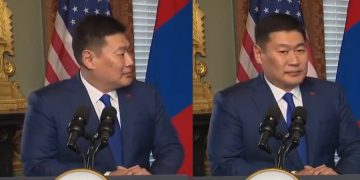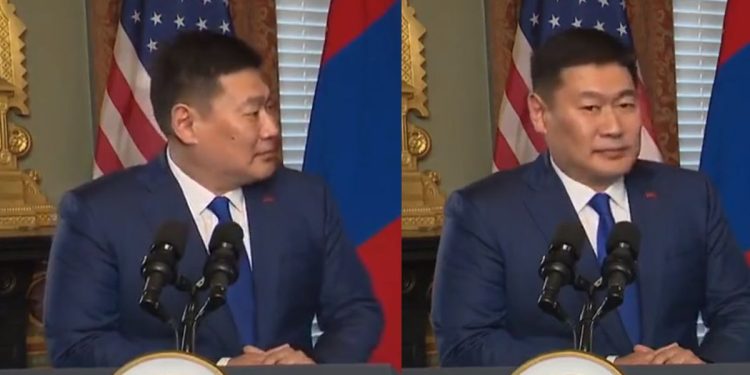Some eight centuries ago, nightmarish hordes of riders charged out of Mongolia and changed the world forever.
In the wake of their sweeping conquest, the Mongol khans made a name for themselves with unforgiving military tactics and cruel punishment for any resistors. The tortures were as varied as they were inventive, from allowing riders to trample carpet-rolled victims to crushing others under gigantic wooden boards serving as dining floors for Mongol officers.
Much to the chagrin of the descendants of these nomadic horsemen living in modern-day Mongolia, they were made to witness their leader endure a gauntlet that not even the wickedest khan could dream up: a conversation with United States Vice President Kamala Harris.
Mongolian Prime Minister Luvsannamsrai Oyun-Erdene came to America and met with Harris Wednesday, the first visit by the nation’s highest leader in five years, according to Politico.
The White House’s transcript of the public meeting appears largely scripted, with Harris promoting U.S. interest in the Indo-Pacific (Mongolia is a landlocked country in Asia) and touting cooperation in space travel.
Oyun-Erdene, for his part, was gracious to Harris and highlighted the decades of friendship between the United States and his nation.
While the White House transcript seems like a professional interaction, video of the event shows Harris’ execution and cadence was less than perfect.
Watch a clip of the interaction below, and pay close attention to Oyun-Erdene’s reaction.
Kamala Harris delivers a word salad to the Mongolian prime minister:
“You and I spoke briefly about the beginning of the next era and, for you, what that means in terms of your leadership and your vision for the future, and certainly strengthening our space cooperation would be… pic.twitter.com/FQ4VJjsGR2
— RNC Research (@RNCResearch) August 3, 2023
Does this appear to be a foreign leader mulling the wise words of an American vice president, or a man simply nodding and trying to hurry Harris’ confusing speech along?
Oyun-Erdene exhibited the kind of enthusiasm most people reserve for when they offer to cover the dinner bill.
Maybe he’s dreaming of a simpler time, when all his ancestors had to worry about was in which direction they would guide their horses.
Instead of the thundering of ten thousand hooves, Oyun-Erdene had to instead listen to Harris drone on about space travel, English language instruction and flights to Mongolia.
Despite the disappointingly modern topics and setting, Oyun-Erdene respectfully stood by as Harris continued spewing word salad.
Following the meeting with Harris, the Mongolian prime minister affirmed the importance of cooperation with the United States regardless of who currently occupies the White House.
“The United States is not just our trading neighbor, it’s the North Star for Mongolia’s market economy and democratic values,” Oyun-Erdene said after the meeting, according to Politico.
Of course, Oyun-Erdene’s remarkable strength in patiently enduring Harris’ verbal vinaigrette was not entirely a selfless endeavor – Mongolia stands to benefit monetarily from a relationship with America.
“I emphasized the importance of U.S. investment and involvement with mega projects in Mongolia,” Oyun-Erdene noted.
It seems to be implied that these “mega projects” will not be cheap, and thus are better left billed to the American taxpayer. While the dust clouds of the Mongol hordes have been wisped away to history books, man’s love of wealth lives on.
This article appeared originally on The Western Journal.
















 Continue with Google
Continue with Google